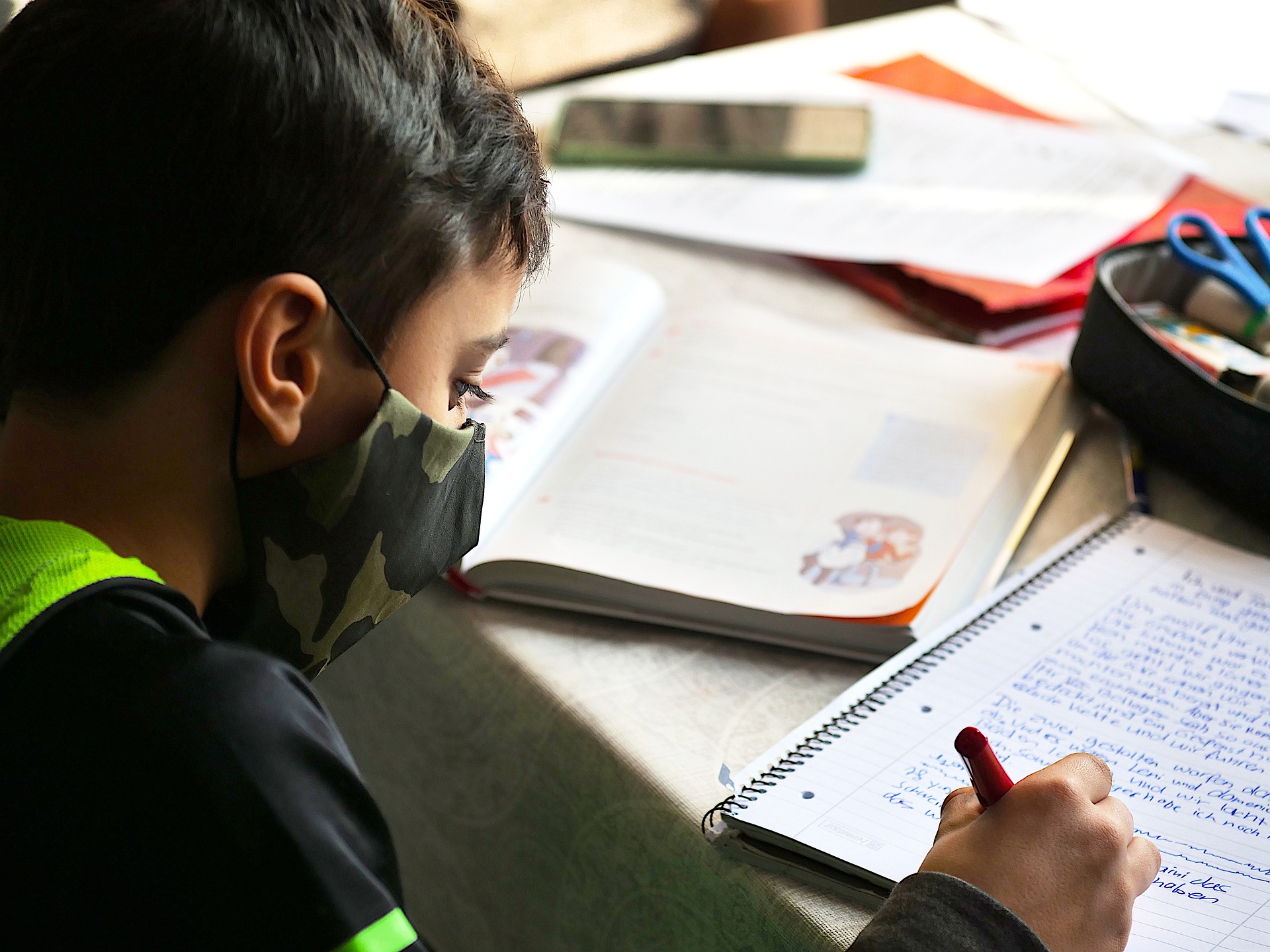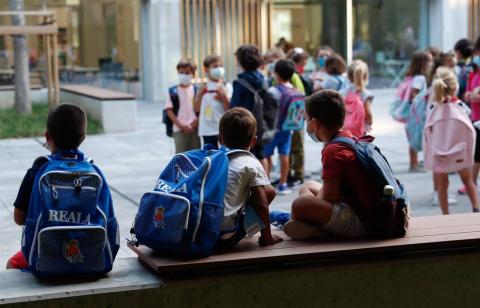Reactions: pandemic caused educational delays equivalent to a third of the academic year
A meta-analysis of 42 studies from 15 countries, including Spain, concludes that the covid-19 pandemic caused learning delays in school-aged children and a loss of knowledge equivalent to 35% of the learning of a school year. The research, published in Nature Human Behaviour, highlights that these effects persisted over time.

Pixabay.
María Fernández - educación pandemia EN
María Fernández Mellizo-Soto
Professor at the Department of Applied Sociology, Faculty of Education, Complutense University of Madrid
The press release reflects quite accurately the results of the research published in the article. The language used is of course informative and simple, but respects the content of the research.
The study is carried out by researchers from excellent institutions. It is quality research, which meets all the standards required for research of this type. The approach is very interesting and the methodology has been designed and executed with precision. The conclusions are based on rigorously conducted analyses and solid data.
As it is a meta-analysis, its value lies precisely in analysing a whole set of studies on this topic, so it summarises well the state of the art. It is in line with the few studies on the impact of the pandemic on learning, which point to a loss in learning, especially for students of lower socio-economic status.
As it is a meta-analysis, and well executed, it excludes research that may have a significant level of bias. The limitations to be taken into account are that the meta-analysis is based on studies that have already been conducted, and therefore the limitations it has are those of integrated studies. As noted in the article, few analyses have been conducted in low-income countries.
From this evidence we know that the pandemic and its implications (closure of educational institutions, online and hybrid teaching) have had a negative impact on students, especially those from lower socio-economic backgrounds. Furthermore, we know that contrary to what was thought, students of all educational levels have been equally affected. This result is evidence that face-to-face education in educational institutions is more effective than distance education, whether online or hybrid. It is also evidence that face-to-face education in schools and universities compensates for the unequal background of students. The results of this research point to measures to compensate for this learning loss, which is carried over time, especially for more vulnerable groups of students.
Cynthia Martínez - educación pandemia EN
Cynthia Martínez Garrido
Professor of Research Methods in Education at the Autonomous University of Madrid
During the covid-19 pandemic, according to the UN, more than 1.6 billion students in 190 countries remained locked indoors without being able to attend school. Far from being the ideal situation, the gap between the haves and have-nots widened. The gap between the most and least affluent families deepened: schoolchildren who had no computer at home, those who shared a single computer for all their siblings, those who had no internet connection at home and those who do not even have an environment available at home to study. Kitchen and living room tables became makeshift libraries, but without the silence and working atmosphere that we know is so necessary for learning.
The education gap also widened, and countries' treatment of the return to the classroom was a crucial element in bringing performance levels back to normal. To give a couple of examples, the policies implemented in Spain kept schoolchildren at home for the last term of the 2019-2020 school year, while in other countries such as Chile schoolchildren were kept at home in 2020 and 2021.
The study aims to find out to what extent the learning progress of schoolchildren has slowed during the pandemic. To meet this objective, the authors conducted a meta-analysis of 42 studies carried out in 15 countries (Australia, Belgium, Brazil, Colombia, Denmark, Spain, United States, Italy, Mexico, Netherlands, United Kingdom, Sweden, Switzerland and South Africa) and the results could not be more interesting: that our students have a delay in the level of achievement that is maintained over time, that this delay has affected mathematics more than reading and that those who have suffered the most are students with lower incomes.
On the other hand, as a meta-analysis study, it has the limitation of the selection of studies and the levels of risk accepted by the authors. Perhaps it would have been advisable not to consider both critical risk studies and those with a high risk of bias. In any case, it is clear that this methodological decision considerably affects the size of the sample available for analysis and its representativeness in geographical terms.
One might expect that schoolchildren would be able to catch up with the learning they have lost at the beginning of the pandemic as they have already joined the classroom. However, previous literature in this regard suggests that learning deficits are difficult to compensate for and tend to persist in the long term, so it is urgent that schools and decision-makers focus their efforts on new programmes, innovations and reinforcements that will help our students overcome the detrimental effects that the covid-19 pandemic created in their development.
Klaus Zierer - pandemia retraso educativo
Klaus Zierer
Professor of School Education, University of Augsburg, Germany
Ever since Visible Learning, John Hattie's milestone in empirical educational research, meta-analyses have been an integral part of educational discourse. They help to calculate a general effectiveness of pedagogical measures from the multitude of research results that are collected worldwide and at the same time make country- or culture-specific characteristics visible. The procedure of a meta-analysis is defined by standards (e.g. 'Prisma') and is adhered to in the present study. In this respect, it can be concluded that the article meets the state of the art in the field of meta-analyses. Incidentally, the results also correspond one-to-one with my own meta-analysis in this field. The more data does not provide a fundamentally new result, but confirms previous meta-analyses on a larger data base.
The relevance of the learning deficit found is immense because it has a direct impact on teaching. The lower the learning performance, the more difficult it becomes for learners to achieve the standards required by the curricula. As a result, a 'Generation COVID can be expected to form, which has suffered particularly badly from the pandemic. This particularly affects the youngest in the system from economically weak countries with educationally deprived backgrounds. This once again highlights the educational inequity in the country and also worldwide. What was not highlighted in the meta-analysis, but for which there is also relevant research, is that the pandemic also had a negative impact on psychosocial development and physical condition. In 'A Year to Forget' I evaluated and analysed this aspect.
Everything should be done to make up for the learning deficits. Unfortunately, many countries missed the first opportunities - keyword 'summer schools' - or implemented them absolutely unreflectively. As a result, even more time has been lost. From research we know (unfortunately) that learning deficits accumulate quickly and therefore become bigger and bigger. The earlier it is possible to counteract this, the better it is. The problem is certainly that in view of a (worldwide) shortage of teachers, there is above all a lack of personnel. In addition, the concepts have not been worked out and everyone is looking to digitalisation, which, however, has not proven to be a saviour in the pandemic, but rather a driver of educational gaps (especially in leisure time due to increasing and unreflective consumption). Rather, digitalisation is a driver of educational injustice because digital media are used differently depending on the level of education. Thus, the challenge for the next two or three years remains to offer sensible concepts here.
From an empirical point of view, summer schools are certainly an interesting option because they have been able to show in the past that they have a positive effect on all children and young people - but especially on learners from educationally deprived milieus. Here, we could benefit from research and existing concepts worldwide. Certainly, digitalisation also offers potential if it is implemented wisely. What has happened in many cases - pushing tablets into the hands of learners and hoping that they will have a positive effect - must be seen as a failure and it is high time to use the possibilities of digitalisation and at the same time avoid the dangers. Thus, digital media can be helpful for individual support, because with them learning paths can be implemented that always place learners in the area of challenging learning tasks and at the same time relieve teachers so that they can relate to the learners even more.
Benjamin Fauth - pandemia retraso educativo
Benjamin Fauth
Head of the Department of Empirical Educational Research, Institute for Educational Analysis Baden-Wurttemberg (IBBW), and Adjunct Professor at the Hector Research Institute of Education Sciences and Psychology, University of Tübingen.
The study is methodologically very well designed. In meta-analyses of this kind (i.e., studies in which the results of many individual studies are considered together), it is important that the quality of the individual studies included in the evaluation is checked very carefully. This has obviously been done very meticulously here. The paper is probably the most comprehensive study to date of post-corona pandemic learning deficits. When interpreting the findings, it must of course be taken into account that studies from different countries were included here, some of whose results cannot be transferred to the German education systems. For example, the learning gaps in poorer countries are once again significantly greater than in a rather rich country like Germany. But overall, we also see learning gaps in this country, and we especially see their uneven distribution: students who already had a harder time before the pandemic are much more affected.
The learning deficits observed in the meta-analysis are significant. Those we found in studies from Germany, for example in Hamburg and in Baden-Wurttemberg, are somewhat smaller, but tend to point in the same direction. Pandemic-related learning deficits certainly also play a role in the findings recently presented in the IQB Education Trends. Not only are the backlogs themselves unevenly distributed socially, but their consequences are also likely to vary widely: many students with the appropriate social background will easily make up for it. However, the consequences will be more severe, especially for lower achievers and for students from less educated homes. In addition, the study focuses on cognitive learning deficits, i.e. on the question of what students have learned - or not learned - in German and math, for example. If you ask teachers, it becomes clear that in addition to the actual learning deficits, there is another problem in the foreground, namely the whole psychosocial area. My impression is that schools currently have a lot of work to do in this area to reestablish certain learning routines and to get the whole social interaction back on track.
The federal government has already made extensive funds available for a so-called catch-up program. But it is also clear that these measures alone will not be enough in the end. Additional support measures are important, of course, but we will only be able to reduce social inequalities if the great heterogeneity (i.e., difference/diversity) of the students is also taken more into account in the normal classroom. In the end, it will only work through targeted support in regular classes as well. If additional resources are made available now, attention must be paid to how these resources are distributed. We can clearly see from the data that certain students have suffered particularly from the pandemic - precisely those who were already having a hard time. The task now must be to provide targeted support for precisely these students - including in regular classes. In a large state like Baden-Wurttemberg, about half of the students now have a so-called migration background. Given this number, we cannot, for example, pretend that it is the normal case that all children in our elementary schools speak perfect German. Such things must be systematically taken into account in the classroom. We can't afford as a democratic society - or, for that matter, as an economy - to have a portion of our students take so little away from school.
It is important to see that many of the problems that are now becoming visible in schools would have to be addressed even without a pandemic. It is good that the connection between the social background of the students has now become more present again as an issue in the education policy debate. Fortunately, there is also a great deal of agreement that these problems must now be addressed. It is also interesting to see that schools have come through the pandemic with varying degrees of success. For example, classes where the relationship between students and their teachers was positive even before the pandemic had a much easier time during the school closures. We saw the importance of good feedback to students that promotes learning at the latest when schools were closed from one day to the next and teachers had to consider the ways in which they could still reach their students at all.“
„There are schools that had already established a system before the pandemic that allows them to keep a close eye on learning progress - so that they can provide direct and targeted support in the event of learning problems. During the school closures, it then became clear how important this is. During the pandemic, there has been huge progress in many schools - not only in digitization, but also in how we can use digital tools pedagogically so that they support learning. I hope these things don't disappear back into closets and drawers now. In perspective, these are also the approaches that will help us deal with the consequences of the pandemic in schools.
"I collaborated on two studies that were included in the meta-analysis (Schult et al.), but otherwise have no conflicts of interest."
Bastian A. Betthäuser et al.
- Research article
- Peer reviewed
- People
- Systematic review
- Meta-analysis



